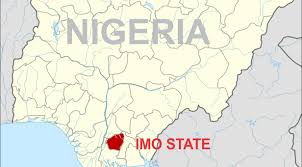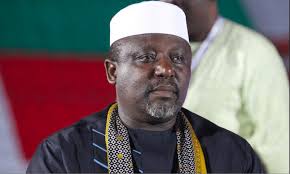A Scot, after having his fill at a bar, staggered out and headed for what he felt was the way home. When asked where he was going to, in his drunken stupor, he replied, “I don’t know where I’m going, but I’m on my way”.
Our good old country Nigeria, freed from the clutches of colonial masters exactly 61 years ago, is certainly on its way. But does it know where it is going? This question becomes a difficult one to answer when we look 61 years backward to review the nation’s turbulent life after independence on October 1, 1960. It’s yet another season of independence anniversary, come Thursday, Oct. 1, and very few faces, just the minutest fraction of the Nigerian population, are smiling in the country.
Nigeria’s major headache as it staggers through tide and time has been political leadership and structure. It is this void in purposeful leadership that accidentally brought the soldiers into government, thereby compounding the country’s problems. The soldiers, in their 30 years of leadership out of the 61, after independence, could not find the answer to our corruption, ethnicism and religious bigotry. At independence, Nigeria embraced the concept of national development planning. Governments had development plans which crashed like dreams of an incapacitated person.
As the leadership continued to change with successive coups and counter coups, various rolling plans sprang up without actually rolling into reality. Policy decisions were taken not on the basis of data, not because of dire need, not merit, but on the whims and caprices of whoever held the reins of power. Rational judgment over matters gave way to ethnic jingoism while profligacy ruled our financial world. The God-sent oil boom of the 70s was frittered away in frivolous projects. While our youth yearned for jobs, our leaders considered festival of arts and culture more expedient to host than expand our industrial base.
Today, we suffer for our sins of the past. Our electricity supply is everything but dependable, our villages and urban settlements are attacked by guinea-worm and typhoid fever due to poor water supply. Our roads are impassable and housing is out of the reach of a great majority. Productive industries domiciled in the major cities of the country in the past have vanished and our youths now find employment in insurgency groups and crime. No more Michelin tyres, no Dunlop, no Berec Batteries, no Phillips radio, National, Sanyo, Volks Wagen, Peugeot, etc. The Bata shoe factories, textile mills and many others that made the Nigeria of old bubble economically are things of the past. No corner of the country is free from kidnappers, armed robbers and internet rats. Nigeria gnashes its teeth in the midst of plenty.
Such has been the nation’s portion for 61 years, 61 solid years of foolery. A fool at 40, they say, is a fool forever. What about a fool at 60?
Twenty-one years ago, Nigeria began a new experiment in democratic governance that gave the nation some hope. Even when we fumbled and floundered in this march toward an enduring political structure, the masses were then united in saying that, at least, we had begun a journey to rationality. At that stage, Nigerians saw a bright future for the nation’s citizens. Very unfortunately, 22 years after that supposed return to democracy, Nigerians can hardly say today that it’s indeed a democracy for the people. It’s rather miraculous that we are yet to have a fragmented nation, dismembered due to ceaseless ethnicity and religious bigotry. It had been foreseen in some quarters that Nigeria would bow to the pressure of size and faulty leadership. Today’s strident clamours for restructuring, self-determination and true federalism lend credence to this view.
Because of the nation’s disrespect for record keeping, statistics, and even continuity in government policies, it is difficult to predict with mechanical precision the nation we might belong to in time to come. So, all we are able to conjecture are blurred visions. Yet, we cannot be very far from the picture, judging by the trend, if we say that the future is bleak. Nigeria goes back and forth in debts, loans used not for concrete developments but for consumption. While other nations are preparing to welcome electric cars and are building tunnels for fast trains, Nigeria is retracing cattle grazing routes and calling in other nationals to fight its citizens for the restoration cattle routes. Now, it has been overtaken by Rwanda, Ghana, South Africa, Singapore, Malaysia, Brazil and other nations that began the civilization race with it.
Nigeria once embarked on privatization of government businesses to entirely remove government from business, leaving the nation’s commerce and industry in the hands of the private sector as it is in developed nations. Again it failed to catalyze growth which would have come from a healthy competition among businesses because another administration halted the move. Had the privatization been concluded, capital flight would have minimized while the corruption rate would have come real lower than it is today. Of course, this boom in economy would have attracted back home the numerous Nigerians in the Diaspora seeking brighter economic fortunes outside. Then, we should have been talking about preventing brain drain and reducing unemployment. But today, the reverse is the case.
Technological growth is nothing to write home about. Dim pictures surround the nation’s indigenous technology. This is because certain phenomena that act as catalysts in a nation’s technology are absent in the country today. The overriding taste for foreign products among Nigerians has impeded, and would continue for a long time to impede, the march to technological independence.
This preference for foreign goods, coupled with the global clamour for trade liberalization among all nations, would hardly bring out the ingenuity of the Nigerian. Therefore, rather than bother about building indigenous planes, cars, electronics and other products arising from hi-Tech, the nation is importing and feeling complacent about it.
The bleak future is further compounded by the general fear whether there would be a united Nigeria in the future. All Nigeria has had are crashed visions and the race seems to be taking the pattern of two steps forward five steps backward. The pilots of the present democratic setting appear to lack the will and, by extension, the confidence of the masses, to take the country far into the future intact, what, with the Boko Haram insurgency, the herdsmen wahala, the so-called bandits that we were told were not criminals, the separatist movements in the southern Nigeria and many more.
At 61, disintegration stares the country in the face. We do not need to consult soothsayer to know this, and critical stakeholders have continued to clamour for restructuring and true federalism as the pill to save the soul of the nation first before other things. We must listen to these stakeholders. Happy 61st independence anniversary to the ever sleeping giant of Africa.









